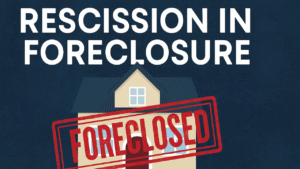 Rescission in Home Foreclosure: What It Means and Why It Matters
Rescission in Home Foreclosure: What It Means and Why It Matters
Foreclosure is one of the most stressful experiences a homeowner can face. When a property is sold at auction due to missed mortgage payments, it often feels like the end of the road. But in certain cases, there’s a legal mechanism that can reverse the sale and offer a second chance: rescission. Understanding rescission in a home foreclosure situation is crucial for homeowners, investors, and real estate professionals alike.
What Is Rescission in Foreclosure?
Rescission refers to the legal cancellation or reversal of a foreclosure sale. It’s a rare but powerful remedy that essentially “undoes” the transfer of ownership, restoring the property to its pre-sale status. Rescission can be initiated by the lender, the courts, or through mutual agreement, depending on the circumstances and state laws.
In simpler terms, rescission is like pressing the reset button on a foreclosure—though it’s not always easy or guaranteed.
Why Would a Foreclosure Be Rescinded?
There are several reasons why a foreclosure sale might be rescinded:
1. Lender Error or Procedural Mistake
Foreclosure laws are strict, and lenders must follow precise procedures. If there’s a mistake—such as improper notice, incorrect sale date, or failure to comply with legal timelines—the lender may choose to rescind the sale to avoid legal liability.
2. Borrower Reinstatement or Settlement
Sometimes, a borrower may pay off the delinquent amount or reach a settlement with the lender shortly after the sale. If the lender agrees, they may rescind the foreclosure to allow the borrower to retain ownership.
3. Title Defects or Legal Challenges
If the buyer discovers a title issue after the sale, or if the foreclosure is legally challenged by the borrower or another party, rescission may be used to resolve the dispute and avoid further litigation.
4. Bankruptcy Complications
If the homeowner files for bankruptcy before the foreclosure sale is finalized, the automatic stay may invalidate the sale. In such cases, rescission is used to correct the error and comply with bankruptcy law.
How Does Rescission Work?
The process of rescission varies by state and by the nature of the foreclosure. In non-judicial foreclosure states like California, lenders have a limited window—typically 21 days—to rescind a sale under Civil Code § 2924h. In judicial foreclosure states like Florida, rescission often requires court approval and may involve a formal motion or settlement agreement.
Key Steps in a Typical Rescission:
- Notice of Rescission: The lender issues a formal notice canceling the foreclosure sale.
- Title Reversion: Ownership reverts to the borrower or lender, depending on the situation.
- Refund of Purchase Funds: If a third-party buyer was involved, they receive a refund of their purchase price.
- Record Correction: The rescission is recorded with the county to update public records.
Rescission in Florida: What Homeowners Should Know
Florida follows a judicial foreclosure process, meaning foreclosures go through the court system. This adds complexity to rescission but also offers more legal safeguards for homeowners.
In Florida, rescission typically occurs under one of the following scenarios:
- Court-ordered rescission due to procedural errors or borrower defenses.
- Mutual agreement between borrower and lender after a settlement.
- Post-sale litigation where the buyer or borrower successfully challenges the sale.
Because Florida courts oversee the foreclosure process, rescission often requires a formal motion and judicial approval. Homeowners facing foreclosure should consult a qualified attorney to explore whether rescission is a viable option.
Impacts of Rescission on Buyers and Borrowers
Rescission can be a lifeline for borrowers—but it’s not without consequences. Here’s how it affects different parties:
🏠 Borrowers
- Pros: May regain ownership, avoid eviction, and preserve credit.
- Cons: May still owe arrears, legal fees, or face future foreclosure if no long-term solution is reached.
💼 Third-Party Buyers
- Pros: Receive a refund of their purchase price.
- Cons: Lose the property, may incur costs, and face delays in investment plans.
🏦 Lenders
- Pros: Avoid legal liability and correct procedural errors.
- Cons: May face reputational damage or financial loss.
Final Thoughts: Is Rescission Right for You?
Rescission is not a guaranteed remedy, but it’s a critical concept for anyone navigating the foreclosure process. Whether you’re a homeowner fighting to keep your property, a buyer investing in foreclosed homes, or a legal professional advising clients, understanding rescission can help you make informed decisions.
If you believe your foreclosure was mishandled or you’ve reached a settlement with your lender, consult a foreclosure attorney to explore your options. In states like Florida, timing and legal strategy are everything—so don’t wait until it’s too late.